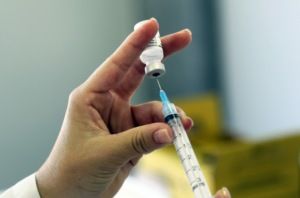News
Over half of Denmark under-dosed with corona vaccine thanks to health authority’s meddling
This article is more than 3 years old.
Sundhedsstyrelsen’s recommendation to take seven doses out of a vial, instead of six, led to 3 million people receiving vaccines that were 10 percent weaker than they should have been

Taking seven instead of six was a mistake, claims DR report (photo: PAHO)
Approximately half the country got corona over the winter of 2021-22, and while there weren’t a huge number of deaths outside vulnerable groups, there was certainly the impression that contracting the virus was no cakewalk, despite the vast majority of the population being triple-vaccinated at that point.
And now it emerges there might be a good reason for this: at least three million in Denmark – those who received the Pfizer-BioNTech vaccine – were underdosed, according to DR.
A decision was taken by the Sundhedsstyrelsen health authority in May 2021, when urgency was growing to vaccinate the population as quickly as possible, to withdraw an extra dose from the vials. This method continued until May 2022.
This underdosed the vaccines by 10 percent, claims the report.
How six became seven
DR recently obtained access to internal documents shared among the various authorities. Meanwhile, it asked Teknologisk Institut to assess the dosing, and its conclusion is that it was a mistake.
Professor Allan Randrup Thomsen from the University of Copenhagen, who has been cited in numerous reports about corona since 2020, is not impressed.
“They have deviated from the rule, which I otherwise have the impression is usually set in stone by the authorities: that you stick to what has been tested,” he told DR.
The 0.3 mL dose approved by the European Medicines Agency (EMA) is the one that “has been used in the trials that precede the vaccine being approved, in which many thousands of people have been involved”, he added.
The EMA recommended that six doses could be extracted from a vial, but Sundhedsstyrelsen approved seven.
Not approved by SSI
Statens Serum Institut (SSI) was also wary of the redosing and sent several warnings to Sundhedsstyrelsen before it made the ruling in May 2021.
Professor Thomsen is astonished that Sundhedsstyrelsen ignored SSI’s advice.
“I am surprised that it was not followed up on. After all, SSI – apart from the Danish Medicines Agency – are the ones responsible for our vaccines, have practical experience and monitor vaccines,” he said. “So if they point it out, I would – if I had been sitting at the other end – take it very seriously.”
However, Sundhedsstyrelsen head Søren Brostrøm does not think the health authority did anything wrong, given the circumstances.
“We have succeeded in Denmark with fantastic optimal utilisation of vaccine doses in a situation where we lacked vaccines. It would have been completely irresponsible of us not to do so,” he told DR.










































